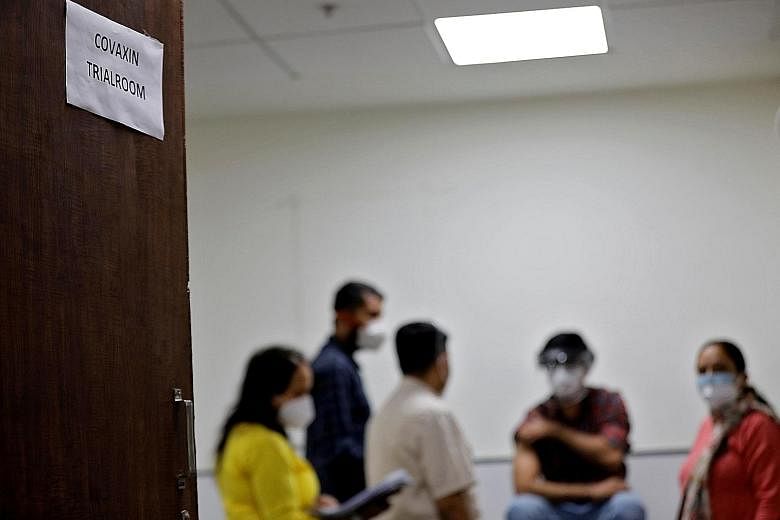At least 100 people in Bhopal city who were in a trial of Covaxin, one of two Covid-19 shots approved in India, alleged that the hospital conducting the trial did not inform them that they were test subjects.
The allegation comes as India prepares to vaccinate 30 million front-line workers from Saturday.
Experts are raising questions about lack of transparency, illegalities and poor data recording in India's ongoing vaccine trials.
On Jan 3, the Indian government authorised Covishield, the AstraZeneca-Oxford University vaccine manufactured by the Serum Institute of India; and Covaxin, a shot developed by India's Bharat Biotech International.
Covaxin, which uses an inactivated Sars-CoV-2 virus, has been approved for restricted emergency use, although its efficacy trial is not complete. It is being tested on 25,800 volunteers across India.
In Bhopal, in the central state of Madhya Pradesh, the People's Medical College recruited 1,700 people between Nov 28 and Dec 31 last year. It is estimated that more than 750 of them are from five poor neighbourhoods near the hospital.
In a videoconference on Sunday, the test subjects said they were led to believe they were getting the shots as part of a government vaccination drive. They were paid 750 rupees (S$14) each for participating.
"A van with loudspeakers came announcing a free corona vaccine. They did not tell us this is a trial," said Mr Mohan Sahu, 57, a peanut vendor who received a dose on Dec 18 last year. He put his thumbprint on the consent forms, but said he did not understand them fully.
Labourer Ratanlal Gotiya, 68, said he was given a booklet in which to note adverse health effects. "My back and legs are aching after I got the shot. But I haven't recorded this because I can't read or write."
Most of the residents are illiterate, daily-wage workers. As paid work is scarce, they said the 750 rupees, paid by the People's Medical College to participants to compensate for loss of wages and travel costs, was a substantial incentive.
The college denies withholding information from participants.
Dr S.K. Sadawarte, dean of the medical college, said: "For illiterate subjects, we read out the consent form, counselled in English and Hindi for 30 minutes, and only after that, we included them."
At least 200 test subjects were also victims of a 1984 gas leak from the Union Carbide (now Dow Chemical) chemical factory in Bhopal. Gas-leak victims continue to suffer grave neurological, respiratory and congenital disorders.
Social activist Rachna Dhingra, who works with victims of the gas leak, said: "These vulnerable people, whose health is already compromised due to the poisonous gas, are being given the Covaxin trial shots without their knowledge.
"Their health problems following the shots are not recorded and the (People's Medical College) has also turned many away when they sought treatment."
The college's vice-chancellor, Dr Rajesh Kapur, said gas-leak victims need not be excluded as per government norms. He said: "Medically, they will tend to benefit more from this vaccine, because their lungs might be compromised."
A newspaper advertisement by the college, too, said Covaxin would be beneficial for participants.
Dr Anant Bhan, a Bhopal-based physician and global bioethics researcher, criticised the assumption of a trial vaccine's benefits as unscientific, illegal and premature. "This is a false promise because they don't know yet if this intervention works. That's the whole reason the efficacy trial is being conducted."
The government approved Covaxin in an unprecedented "clinical trial mode", meaning those vaccinated would be like trial participants - they must give informed consent and be followed up on.
Bharat Biotech founder Krishna Ella said it was still unclear how the new data set will be considered in terms of efficacy.
On Dec 30 last year, a 42-year-old labourer who was a trial participant died in Bhopal, but Bharat Biotech said this was unconnected to the vaccine.
Ms Malini Aisola, co-convenor of the All India Drug Action Network, said: "The lack of adverse events was a crucial consideration for the approval of Covaxin. But the company hadn't mentioned the death during its Dec 31 presentation to the expert committee that authorised the use of Covaxin."
In a letter on Sunday to Prime Minister Narendra Modi and Health Minister Harsh Vardhan, Bhopal-based organisations sought punishment for negligence and compensation for those affected.

